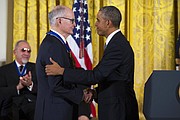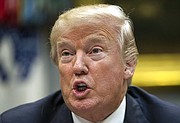With CHARLIE HARPER
The World Meteorological Organization this week revealed its annual report on the state of the global climate. It won’t surprise anyone to hear the forecast is dire. The decade that is about to expire at the end of this month has been the warmest in recorded history. Ocean temperatures are similarly at their highest ever recorded levels, since the oceans ultimately absorb around 90 percent of the earth’s greenhouse gases. The WMO report and others suggest world sea levels could rise by two feet during this century.
Adding considerably to the worldwide angst on the subject, American President Donald Trump has pulled the US out of the Paris climate agreement and, perhaps even worse, imposed a squadron of fossil fuel industry aides and lobbyists on to the management team at the American Environmental Protection Agency. These folks have been methodically undoing some of the environmentally friendly measures enacted under Barack Obama and his predecessors, going all the way back nearly 50 years to the founding of the EPA under Richard Nixon.
As painful as it may be to admit, the current American administration’s overtly lax and even regressive attitude and behaviour toward carbon-based industry regulations may significantly underpin the continuing, almost counterintuitive US economic boom. You can find economists to argue all sides of this question, but doesn’t it sort of stand to reason that if always expensive sanctions insuring environmental protection compliance are removed, industry profits – and confidence – will rise? A result of that confidence might just be sustained economic growth and low unemployment.
The WMO report warns of the disastrous consequences of short-sighted current policies, but if, like Trump, your highest and seemingly only priority is your re-election next year, why worry about 80 years from now?
Which brings us to William Ruckelshaus. This estimable American died the other day at the age of 87. He played a very significant, even historic, role in two things that are always in the news these days. One is the environment. The other is the impeachment of an American president, and we’ll come back to that in a moment.
Ruckelshaus was the first administrator of the EPA when it was formed in 1970. The Clean Air Act was also enacted by the American Congress in that same year, and one of its consequences was the integration of emissions-reducing catalytic converters on all American automobiles.
New EPA administrator Ruckelshaus also ordered the mayors of Atlanta, Cleveland and Detroit to clean up their waterways or face legal action. Continuing to wield his big environmental stick, Ruckelshaus also led the successful fight to ban DDT, called the “elixir of death” in Rachel Carson’s famous 1962 book Silent Spring. DDT poisoning of birds almost led to the extinction of the American bald eagle.
After getting EPA launched, Ruckelshaus returned to private industry.
But the seductiveness of lax regulation and venality overtook EPA soon after Ronald Reagan was elected president in 1980, and Reagan was forced to ask Ruckelshaus to come back and rescue the environmental agency in 1983. (In a disturbing footnote and possible warning for the future, the anti-environment person he replaced at EPA was the mother of Trump Supreme Court appointee Neil Gorsuch.)
In 2008, Time magazine selected Ruckelshaus as among the very best cabinet secretaries in US history. Seven years later, Obama awarded him the Presidential Medal of Freedom, America’s highest civilian honour.
When Ruckelshaus left EPA the first time back in 1973, he was tapped by Nixon to serve as acting FBI director and then deputy attorney general. Enjoying wide popularity after his success at EPA, Ruckelshaus was dubbed “Mr. Clean,” and Nixon hoped he could restore sagging public faith in his Justice Department led then, as now, by presidential flacks and sycophants.
The special moment in the spotlight of history for Ruckelshaus came in October 1973. A special prosecutor, Archibald Cox, had been appointed by Attorney General Elliot Richardson to investigate the Watergate break-in. Cox, a feisty sort, sought access to White House telephone tapes. Nixon refused, since the tapes would reveal his active complicity in Watergate.
Nixon ordered Richardson to fire the annoying Cox. Richardson refused and resigned. Next up in the pecking order was Ruckelshaus, who also refused to fire Cox and also resigned. Nixon finally found someone would fire Cox. That was Robert Bork, another Justice Department official.
Fifteen years later, Bork was nominated to the Supreme Court, but Democrats in the Senate stonewalled his nomination and eventually it was withdrawn. Lingering GOP resentment for that action fuelled Republican stiff-arming of Obama’s 2016 nomination of Merrick Garland to the Supreme Court – which led to Trump’s nomination of Neil Gorsuch.
What goes around, comes around.
The gender gap now a potent political force in America
Speaking of impeachment, we move this week into a new phase of the effort by House Democrats to remove Trump from office, either through a Senate trial (highly unlikely but it’s still early in the process) or via election defeat in November 2020. Intelligence Committee hearings and Chairman Adam Schiff’s subsequent cogent report are both designed to serve this same end, as is the House Judiciary Committee effort to now set up a constitutional basis for punishing Trump’s general outrageousness.
As the impeachment drama proceeds, the gender gap has reemerged as a potent political force in American politics. The difference in how men and women engage in politics and vote has often been significant for electoral outcomes, but perhaps never so much as last year and next year.
It has been recently reported that in the 2018 midterm elections, 59 percent of women voted for Democrats as they emphatically retook control of the House of Representatives and regained several state governorships. 51 percent of men voted Republican in those same elections.
On impeachment of Trump, the divide was even greater. A poll by CNN last week revealed that 61 percent of women supported impeachment and removal from office of Trump. Only 40 percent of surveyed men felt the same way.
Furthermore, in the same survey, 20 percent of men said they might change their mind on impeachment. But only nine percent of women had not firmly decided on the issue.
Overall, though, it doesn’t seem as though the House Intelligence Committee hearings changed too many voters’ minds. Maybe the Judiciary Committee hearings won’t, either. After that, the House will forward a bill of impeachment to the Senate, controlled by Republicans and host to a trial guided by GOP appointee and conservative Supreme Court Chief Justice John Roberts.
Does anyone think a Senate trial will change many minds either? The American political process seems locked in on next November.
When geography and politics get mixed up
America’s tech giants like Facebook, Amazon, Google and Apple have generally been able to avoid becoming ensnared in the dirty business of politics, but that’s been changing in recent years. Now, courtesy of the Washington Post, comes further evidence that tech and politics are intertwined.
Apple has reportedly decided to depict Crimea as part of Russia in the apps it deploys in the Russian market. This follows six months of negotiations between Russian authorities and Apple. Ukraine, from which the Russians seized Crimea in 2014, is understandably outraged.
Ukrainian officials in Kiev and Washington have taken to Twitter and Facebook to protest. But the Russian market is bigger than the Ukrainian market, and Apple is, after all, a huge international business giant.
The uncomfortable intersection of tech and politics doesn’t stop at the shores of the Black Sea, however. The Chinese are reportedly increasing pressure on international businesses, including Apple, to stop making reference to Taiwan as an independent entity. Similarly, China wants Hong Kong and Macao listed as part of China.
Maybe the search for relief from such nagging day to day issues is part of why Google founders Larry Page and Sergei Brin are relinquishing their roles as CEO and President of Google parent company Alphabet. As Page and Brin surely know, there will be plenty more of the same in the future.







Comments
Use the comment form below to begin a discussion about this content.
Sign in to comment
Or login with:
OpenID